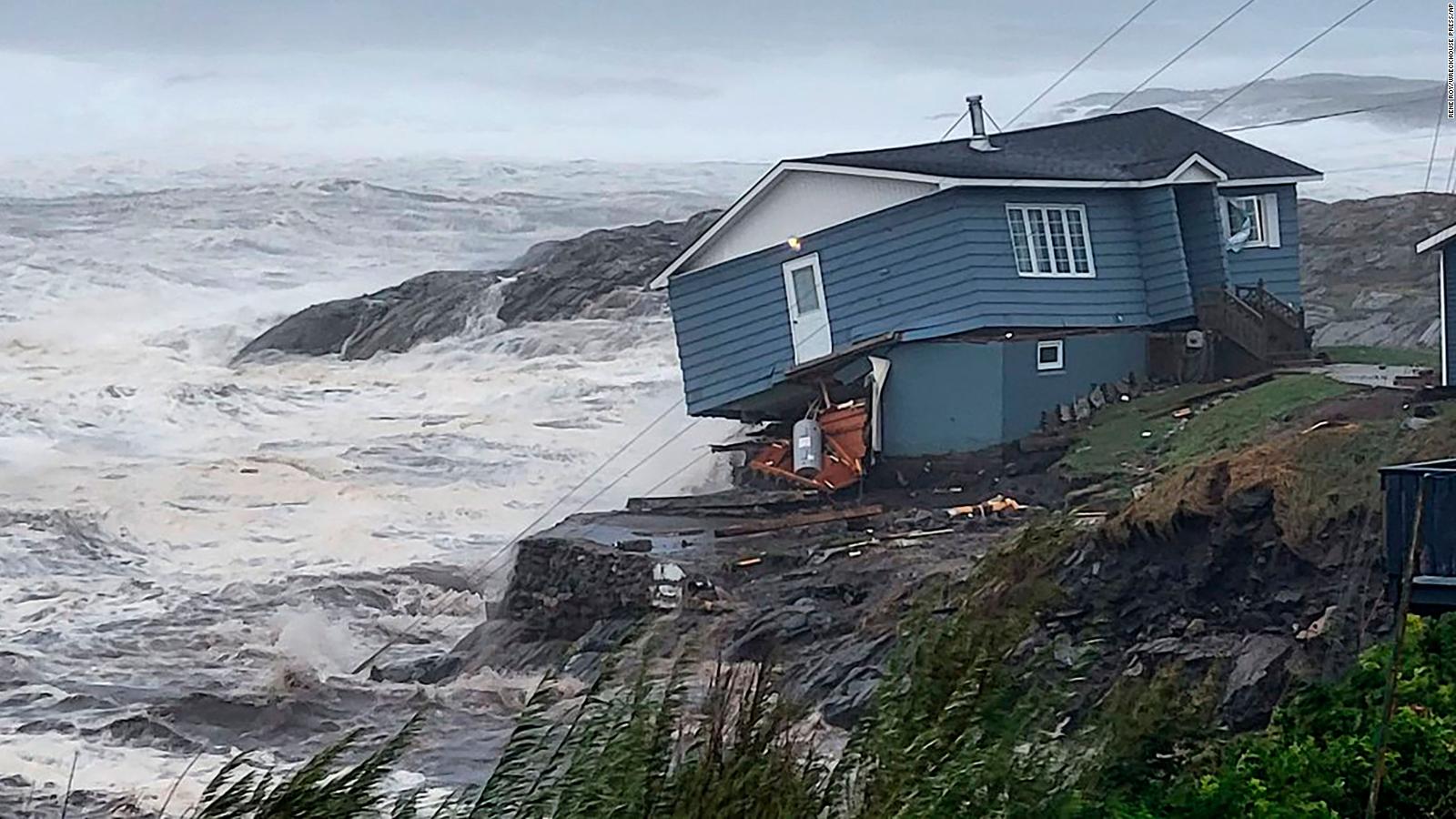See Fiona wrecked on Canada's east coast 1:12
(CNN) --
Storm Fiona slammed into Canada's east coast with gale-force winds and torrential rain on Saturday, sweeping buildings into the ocean, toppling homes, toppling trees and knocking out power to hundreds of thousands of people.
Fiona first wreaked havoc in the Caribbean as a hurricane before moving across the Atlantic and making landfall again as a post-tropical cyclone.
The storm blazed a path of destruction across Nova Scotia, New Brunswick, Prince Edward Island and Newfoundland before weakening and moving out to sea on Sunday.
Now, the authorities are beginning to account for the damage caused in the region.
Nova Scotia, where Fiona first made landfall during the early hours of Saturday morning, was hit hard by the storm.
High winds toppled trees and power lines, flooded roads, littered neighborhoods with debris and, in many cases, snapped power poles in half, officials said.
Watch drone video inside Fiona's rage 0:40
Authorities made restoring power a priority after Fiona devastated power lines and communication networks across the province, Prime Minister Tim Houston said Sunday morning.
"Clearing the roads, giving crews room to do what needs to be done, that's the most important thing right now," Houston said.
"It will take time."
advertising
One person in Newfoundland reportedly died in the storm.
Houston said there haven't been many reports of serious injuries, although about 200 people are currently displaced from their homes.
"The damage is significant, but right now the priority is to get people back on power, to get people to a safe haven, to get, you know, back to normal," he said.
"That will take time when we get out of this."
Canadian Prime Minister Justin Trudeau said Saturday that the government has approved Nova Scotia's request for federal assistance and that the Canadian Armed Forces will be deployed to help in the region.
The prime minister said residents experienced a "terrifying" 12-hour Saturday.
"People have seen their homes razed to the ground, seen the winds rip the roofs off of schools," Trudeau said.
"And as Canadians, as we always do in difficult times, we will be there for each other."
In Charlottetown on Prince Edward Island, police shared images of downed power lines on buildings, downed trees blocking roads and puncturing structures.
The region's utility, Maritime Electric, said it was concerned about people walking and driving on streets where there is widespread damage from downed power lines and possible live wires.
Power outages in Nova Scotia
Several provinces were affected by high winds and rain, but none more so than Nova Scotia.
As of early Monday morning, more than 284,400 customers were still without power in Nova Scotia, Prince Edward Island and New Brunswick, including more than 190,400 in Nova Scotia, according to Poweroutage.com.
Nearly three-quarters of Nova Scotia lost power as Fiona moved forward, Houston said Saturday.
Maximum wind gusts of 171 km/h (106 mph) were recorded in the city of Arisaig in the province on Saturday.
Meanwhile, Wreckhouse in Newfoundland saw gusts of 105 mph (170 km/h).
Poor weather conditions have hampered power restoration efforts, Nova Scotia Power President and CEO Peter Gregg said Saturday.
More than 900 power technicians were on their way to the area, but some customers may experience power outages for several days, he said.
In Nova Scotia's capital, Halifax, strong winds uprooted trees and downed power lines, sending sparks flying and blowing out lights.
The roof of a Halifax apartment complex collapsed, forcing about 100 people into shelter, Mayor Mike Savage told CNN on Saturday.
"The magnitude of this storm has been impressive," Savage said later at a news conference on Saturday.
"It turned out to be everything planned."
Osborne Head in Nova Scotia received 7.5 inches of rain and Crowe Brook in New Brunswick received 4.2 inches), among other heavy rain amounts across the provinces.
Fiona worse than Maria?
The drama of those who lost everything in Puerto Rico 3:04
'Total War Zone'
In Newfoundland, a video showed buildings floating in water and cars submerged in heavy rain.
A woman was pulled from the water after her house collapsed, according to the Royal Canadian Mounted Police.
She was taken to a hospital;
the extent of her injuries was not immediately known, police said.
Port aux Basques, a city in the southwestern tip of Newfoundland, was also one of the worst-affected areas, Trudeau said on Saturday.
"We are seeing devastating images coming out of Port aux Basques," he said.
"Obviously when we see images of houses falling into the sea, of waves destroying property and buildings, our first thought should be of people."
The Royal Canadian Mounted Police on Sunday recovered the body of a 73-year-old woman who had been thrown into the sea the day before in Port aux Basques.
"The woman was last seen inside the residence moments before a wave hit the home and ripped out a portion of the basement," police said in a news release.
This is the first death attributed to Fiona in Canada.
The storm claimed at least six other lives along its path: one in Guadeloupe, three in Puerto Rico and two in the Dominican Republic.
First responders in Port aux Basques were dealing with multiple electrical fires, residential flooding and mudslides.
"We have a total war zone here, we have destruction everywhere," Port aux Basques Mayor Brian Button said in a video update, warning that more storm surge is expected.
Port aux Basques is now under a boil water order, and many residents remained without power.
Concrete barriers were also installed around areas that the storm turned into "danger zones," the mayor said.
The Port aux Basques tide gauge recorded a maximum total water level of 2.73 meters (8.96 feet), surpassing its previous record of 2.71 meters (8.89 feet) set in 2017, according to the Canadian Hurricane Center. .
CNN's Derek Van Dam, Eric Levenson, Tina Burnside, Jason Hanna, Christina Maxouris, Hannah Sarisohn and Andy Rose contributed to this report.
Fiona












